PRINTS AVAILABLE HERE:
https://www.etsy.com/listing/80471321/a-little-helper-reproduction
The world of film lost one of the greats on Sunday: composer John Barry. British by birth, he carved a place for himself in Hollywood, winning five Oscars over the course of his career. He cut his teeth on James Bond films – Dr. No, (1962), From Russia With Love (1963), Goldfinger (1964), Thunderball (1965) – and went on to compose seven more. There was something both elegant and hip about these scores, a kind of jazzy sophistication that connoted fast cars, beautiful women, and martinis, shaken not stirred, that is. A jack of all musical trades, he turned to Born Free (1966) and gave it a lush symphonic score and hit song. By 1966, when he won his first Academy Awards (and he won two that year: Best Song and Best Score for Born Free), he became one of the most high profile film composers in the world. He was only 33.
He had an eclectic taste when it came to choosing films – small independent films, huge studio epics, and everything in between – coupled with wide-ranging and versatile compositional skill that could produce a twangy country and western-inspired score for Midnight Cowboy (1969), a jazz-infused score for The Cotton Club (1984), an anxiety-filled score for The Ipcress File (1965), a sensual score for Body Heat (1981), a synthesized score for The Jagged Edge (1985), and a symphonic sound for Out of Africa (1985). He will largely be remembered, though, for those Bond scores – as well he should. They musically define the texture of those films, their time and place, and above all Bond himself with the electric guitar riff that Barry brought to the 007 theme.
But it is the score for Dances With Wolves (1990) that I will remember him for. Like Out of Africa, it is lush, symphonic, melody-laden. But like no other western score that I know of, it manages to avoid the stereotypes for Indians that riddle many of Hollywood’s best western film scores. And I am certainly not the first or the only one to notice this: no tom-tom rhythms, no modal harmonies, no use of fourths and fifths, no dissonance to represent the Sioux
This year's Chicago Tribune Young Adult Book Prize will be awarded to Neil Gaiman. Join us in congratulating Neil at the Chicago Public Library at 12pm Saturday, June 6, 2009. This event will be free, but it is a ticketed event because space is limited. Check back May 18, 2009 for ticketing information.
 Narrow Stairs by Death Cab for Cutie is a nice album to mellow out to. I’ve been listening to the CD enroute to work and back and find myself wanting to listen to the album over and over again. Irritating if you’re a passenger in my car, but hey, I’m a sole commuter so nobody has to listen to my obnoxious reptitious playlists.
Narrow Stairs by Death Cab for Cutie is a nice album to mellow out to. I’ve been listening to the CD enroute to work and back and find myself wanting to listen to the album over and over again. Irritating if you’re a passenger in my car, but hey, I’m a sole commuter so nobody has to listen to my obnoxious reptitious playlists.
As with most music I find it hard to articulate what I like about it. There’s something in the instrumentals, something in the vocals, something in the lyrics, etc. I guess what I like most about Narrow Stairs is that it’s not something I’m accustomed to listening to yet, yet I find myself humming. It’d be a good soundtrack in the background of my life right now. In the midst of change but still in the same place.
In other music news I found that My Bloody Valentine is on tour again! While in a fit of finding stuff on youtube and playing the whatever happened to…game we came across this information. We were actually watching some footage of Lush and Miki Berenyi. Yes, I know I’m living in the past when it comes to music.

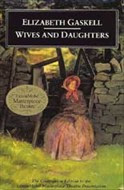
 Gaskell, Elizabeth. 1866. Wives and Daughters.
Gaskell, Elizabeth. 1866. Wives and Daughters.
To begin with the old rigmarole of childhood. In a country there was a shire, and in that shire there was a town, and in that town there was a house, and in that house there was a room, and in that room there was a bed, and in that bed there lay a little girl; wide awake and longing to get up, but not daring to do so for fear of the unseen power in the next room; a certain Betty, whose slumbers must not be disturbed until six o'clock struck, when she wakened of herself 'as sure as clockwork' and left the household very little peace afterwards. It was a June morning, and early as it was, the room was full of sunny warmth and light.
This first chapter introduces us to a young Molly Gibson. She's around twelve at the time give or take a little. And she is most eager to go to her 'first' 'real' social event: a tea hosted by the Lord and Lady of the region--Lord and Lady Cumnor. The Cumnor's estate--they have several--in the region was called The Towers. (Usually they reside elsewhere. This is definitely just their country vacation home.) At this grand party, the young girl gets bored wanders into the gardens, falls asleep, is later discovered by the former-governess-then widow, Mrs. Kirkpatrick. (The family STILL calls her Miss Clare.) This discovery ruins the day for her. It's not that the family treats her poorly, it's just that when Mrs. Kirkpatrick tells the young girl to rest from being out in the sun (or some such notion) in her room, the girl falls asleep and misses her ride home. So she awakens hours later alone and confused and wanting to go home and be with her dad. (Her mother died when she was just a wee thing.) Her dad, the doctor, a somewhat dignified, genuinely respected doctor, comes to her rescue, however, and she's saved the embarrassment of having to sleep over.
A few chapters later Molly has grown from twelve to sixteen. She's becoming a young lady, an attractive young lady. And her father is noticing the transition. Feeling overwhelmed by the thought of raising her alone, he decides to remarry. It's not that he decides this overnight. At first he resists the notion. But as the idea sits with him, it grows on him more and more. When he discovers that Mrs. Kirkpatrick is once again visiting The Towers (after quite a few years absence from the region) he decides to call on the family and see if she might not do as a wife. He knows or vaguely remembers that she has a daughter around Molly's age. He hopes that the idea of raising a daughter without a father will seem equally daunting to her as raising a daughter without a mother.
Molly is SO NOT HAPPY with the idea of a stepmother and stepsister.
And here my summary must stop. The book is long 648 pages. But it is good in a steady kind of way. It is slow; It is steady; It is good; It improves with each bit. (What do I mean by "bit"? Well, the descriptions seem heavy and largely unnecessary--very weighty--at the very beginning. But towards the middle and especially at the end, it begins to make sense. These descriptive bits which you take for fluff at first, are meant to pad the resulting pages. In other words, they help explain or fill out or give substance to the rest. It's not that you'll desperately need that information, but it will make more sense and be a better read if you resist the urge to skip and skim. Gaskell has a HUGE task. She brings to life a whole community. From the Gibsons to the Kirkpatricks to the Cumnors to the Hamleys to the town busybodies. A real panoramic, sweeping view or portrait of life.
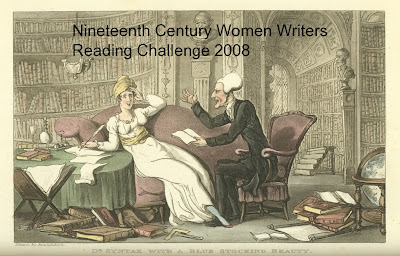
If you are participating in the Nineteenth Century Women Writers Reading Challenge, I wanted to let you know that I would love to see how you're doing, how you're progressing. I'll be posting links to reviews. So if you want to be included in the roundup, please leave a comment with your link. If you don't have a blog, please feel free to leave thoughts, and mini-reviews in the comments.
I've read three books so far: I have read Persuasion and Northanger Abbey both by Jane Austen. And I have read Wives and Daughters by Elizabeth Gaskell.
Chris has read Sonnets from the Portuguese and Other Love Poems by Elizabeth Barrett Browning.
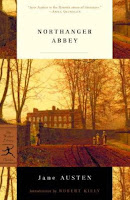
If I'm being honest, Northanger Abbey has never been one of my favorites. The book, well, the book just seemed to lack that magic spark, that sizzle, those ahhh life-is-good moments that Pride and Prejudice and Persuasion seem to encompass. It's not that I don't think the novel has its moments of charm. I do. The first sentence (or so) is magnificent: "No one who had ever seen Catherine Morland in her infancy would have supposed her born to be an heroine. Her situation in life, the character of her father and mother, her own person and disposition, were all equally against her." In the first few pages, there are just some stand-out phrases that are pure wit (or satire or sarcasm). For example, "But from fifteen to seventeen she was in training for a heroine; she read all such works as heroines must read to supply their memories with those quotations which are so serviceable and so soothing in the vicissitudes of their eventful lives." And I love this bit, "She had reached the age of seventeen without having seen one amiable youth who could call forth her sensibility; without having inspired one real passion, and without having excited even any admiration but what was very moderate and very transient. This was strange indeed! But strange things may be generally accounted for if their cause be fairly searched out. There was not one lord in the neighborhood; no, not even a baronet. There was not one family among their acquaintances who had reared and supported a boy accidentally found at their door; not one young man whose origin was unknown. Her father had no ward, the the squire of the parish no children. But when a young lady is to be a heroine, the perverseness of forty surrounding families cannot prevent her. Something must and will happen to throw a hero in her way." I love that...."something must and will happen to throw a hero in her way." Perfect tongue-in-cheek beginning to a rather ordinary trip to Bath.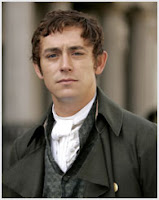 Our heroine--our want-to-be-heroine--Catherine is seventeen. She has been invited to go to Bath to be a companion to Mr. and Mrs. Allen, the Morland's friendly (and childless) neighbors. At first, their trip is boring. The Allens don't know anyone in Bath. They can't very well go about introducing themselves to strangers. Catherine who longs to dance and soar in popularity can't go about conversing with strange young men. All seems rather dreary until they are introduced to a Mr. Henry Tilney. Suddenly, Catherine's eyes begin to sparkle and her heart begins to pound. (And if Austen's imagined character resembles JJ Feild, no wonder, Catherine is so swept up! Anyone's imagination would be prone to getting carried away all of a sudden. (Pictures of the cast can be found here and here and of course the Masterpiece Theatre site.) Soon after, the Allens meet the Thorpes. Mrs. Thorpe and Mrs. Allen having been school chums several decades before. Isabella Thorpe. Soon to be Catherine's instant new best friend.
Our heroine--our want-to-be-heroine--Catherine is seventeen. She has been invited to go to Bath to be a companion to Mr. and Mrs. Allen, the Morland's friendly (and childless) neighbors. At first, their trip is boring. The Allens don't know anyone in Bath. They can't very well go about introducing themselves to strangers. Catherine who longs to dance and soar in popularity can't go about conversing with strange young men. All seems rather dreary until they are introduced to a Mr. Henry Tilney. Suddenly, Catherine's eyes begin to sparkle and her heart begins to pound. (And if Austen's imagined character resembles JJ Feild, no wonder, Catherine is so swept up! Anyone's imagination would be prone to getting carried away all of a sudden. (Pictures of the cast can be found here and here and of course the Masterpiece Theatre site.) Soon after, the Allens meet the Thorpes. Mrs. Thorpe and Mrs. Allen having been school chums several decades before. Isabella Thorpe. Soon to be Catherine's instant new best friend. 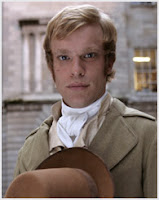 and (Perhaps we should all learn a lesson about people that are that clingy and chummy from the second you meet them.) A further coincidence occurs a bit later on when Mr. James Morland--Catherine's older brother--and Mr. John Thorpe suddenly appear on the scene. James is smitten with Isabella. And John is smitten with Catherine. (Catherine, however, remains smitten with Henry. Which girl wouldn't stay true, I tell you. Especially if the competition is John Thorpe. A man who was giving off creepy vibes almost from the very beginning. So the ThorpesMorlands are all chummy in a way. When the Tilneys reenter the scene. Mr. Henry Tilney is now accompanied by his father, General Tilney, a genuinely spooky and temperamental fellow, and his sweet and gentle sister, Eleanor. Miss Eleanor Tilney and Catherine while getting off to a bit of a bumpy start, soon become friends. Is Isabella happy? No. Just the first sign of trouble from her. So we've got Catherine being pursued by both John and Henry. Isabella being pursued by James and the noticeably arrogant Captain Tilney. (Henry's older brother who just happens to drop by and takes a noted interest in wooing Isabella away from her intended and straight into his bed.) All this drama and we haven't even heard mention of Northanger Abbey!
and (Perhaps we should all learn a lesson about people that are that clingy and chummy from the second you meet them.) A further coincidence occurs a bit later on when Mr. James Morland--Catherine's older brother--and Mr. John Thorpe suddenly appear on the scene. James is smitten with Isabella. And John is smitten with Catherine. (Catherine, however, remains smitten with Henry. Which girl wouldn't stay true, I tell you. Especially if the competition is John Thorpe. A man who was giving off creepy vibes almost from the very beginning. So the ThorpesMorlands are all chummy in a way. When the Tilneys reenter the scene. Mr. Henry Tilney is now accompanied by his father, General Tilney, a genuinely spooky and temperamental fellow, and his sweet and gentle sister, Eleanor. Miss Eleanor Tilney and Catherine while getting off to a bit of a bumpy start, soon become friends. Is Isabella happy? No. Just the first sign of trouble from her. So we've got Catherine being pursued by both John and Henry. Isabella being pursued by James and the noticeably arrogant Captain Tilney. (Henry's older brother who just happens to drop by and takes a noted interest in wooing Isabella away from her intended and straight into his bed.) All this drama and we haven't even heard mention of Northanger Abbey!
Well, I don't want to spoil this for anyone. Drama--some real, some imagined--is what you'll find in Austen's Northanger Abbey.
I read the book on Saturday afternoon/night. I liked it. It was okay. But on the screen it sizzled. It just worked. It was practically perfect in every way. Henry Tilney was the perfect hero. He was so thoroughly charming and witty. So adorably there for the girl. Always knowing just what to do, just what to say. Sigh. Sigh. Sigh. But my appreciation for the movie goes beyond the chemistry of Henry Tilney and Catherine Morland. Everything just worked. The mood. The tone. The music--the score. The dialogue. They truly captured the essence of this book. And in my opinion--and it is just my opinion--improved on it. Maybe it just works better--the plot, the characters, the dialogue--acted out instead of read. I am no expert on Northanger Abbey by any means, but to my reckoning it was true enough to the book that if it did in fact deviate at some point it wasn't glaringly, obviously, punch-you-in-the-gut contrary. That being said, it SPED things up considerably. Instead of showing the Allen's out of their element and bored and wondering what to do about it for a week or maybe two weeks, they meet Mr. Tilney at the first social gathering they attend. That wasn't in the book. And it happened several times. The book shows things happening gradually--slowly. There is more detailed action and characterization. (For example, the movie doesn't show James wooing Isabella at all. Or hardly at all. They just don't focus on that aspect of the book.) But do we lose the heart and soul of the story by watching things develop so quickly? Yes and no. Quite honestly, I would have LOVED this one to be two or three hours long. I wouldn't have been bored with more story, more details, more of everything really. I would have been happy. But still, there aren't any complaints from me. They got it right this time. It is just fun and delightful and enjoyable and happy-making. I think it says something when my mom and I both wear the same silly ear-to-ear grins at the end of a movie. I would imagine, I would hope, we're not the only ones out there who loved that oh-so-magical ending.
Here is an early clip of the movie. (We're about five or six minutes into the movie when this starts.) I chose this because I didn't want to spoil the movie for anyone, but I wanted to show something of Henry and Catherine.
A continuation of the scene--the all-important boy meets girl and starts to flirt scene.
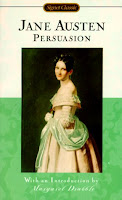
How do I love thee? Let me count the ways....
Persuasion by Jane Austen has to be--without a doubt--my favorite, favorite Austen novel. I've only read it twice, but each time was oh-so-magical. Though I will *admit* that it perhaps isn't a book that will "grab" you from page one. It might take some patience and effort, but give it a chapter or two (or three) and you might just find yourself swept up in the story of Anne Elliot.
Sir Walter Eliott, of Kellynch-hall, in Somersetshire, was a man who, for his own amusement, never took up any book but the Barnetage; there he found occupation for an idle hour, and consolation in a distressed one; there his faculties were roused into admiration and respect, by contemplating the limited remnant of the earliest patents; there any unwelcome sensations, arising from domestic affairs, changed naturally into pity and contempt, as he turned over the almost endless creations of the last century--and there, if every other leaf were powerless, he could read his own history with an interest which never failed--this was the page at which the favorite volume always opened: Elliot of Kellynch-Hall.
See what I mean about NOT being an opening that will hook you? Long story short...or three reasons why you should read Persuasion despite its verbose, pompous opening....
1) It is the story of Anne Elliot. A middle child, a daughter obviously, born into a pompous and atrocious family muddles through the best she can while waiting for her Prince to come. (Okay, she's not really waiting for her Prince to come and rescue her. She's all but given up on love since she's also, at age 27, an "old maid.")
2) Despite coming from a ghastly, horribly obnoxious family, Anne herself is not only intelligent and genuine but she's also thoroughly enjoyable and likable. She has a wit and cleverness about her. She actually sees the world around her. She isn't blind to reality like so many of the other characters.
3) Persuasion is all about second chances. Anne Elliot, a girl who truly deserves good things because her family is so rotten, lost her one chance for love and happiness eight years before our narrative opens. Her heart belonged--then and now--to a young man, a sailor, Frederick Wentworth. But her family and friends deemed him unworthy and unacceptable. And forced into choosing between her family and her love, she chose her family. A decision she regretted from the moment she broke her lover's heart.
When Persuasion opens the reader learns that hard times have come to the Elliot family--a family mostly known for its arrogance and pride. The family is *forced* into renting their out their estate to an Admiral Croft and his wife. The Elliot family--all but Anne--will reside in Bath year round. Anne, poor Anne, only Anne, will be parceled out as need be between Bath and her father and older sister, Elizabeth, and her younger sister, Mary.
What can I say about Mary? Mary is interesting--and by interesting I mean obnoxious and annoying--in a completely different way than her father, Sir Walter, and her sister, Elizabeth. Mary is married to Charles. Charles Musgrove. Charles and Mary and their two children live on the estate--in a smaller house--as his parents and his sisters. They live in the "great house." Anne's time spent with her sister and her sister's in-laws is interesting to say the least. Mainly because someone has just arrived in the neighborhood. A Captain Wentworth. Captain Frederick Wentworth.
Just the sight of him makes her heart skip a beat--or two or three--she loves him like she's always loved him. But he's out of reach. He's now courting--of all people--one of the Musgrove sisters.
Love. Requited. Unrequited. Broken hearts. Regret. Jealousy. Disappointment. Frustration. It's all there with just a little more besides.
I do not want to spoil this one for anyone. Really. I don't want to. So please, please, please stop reading if you haven't read the novel. I mean it.
S
P
O
I
L
E
R
There are just a few scenes--one really big scene--that makes this novel oh-so-magical. That takes it from nice to really really great.
I love, love, love the conversation between Anne Elliot and Captain Harville. Their discussion on which sex--which gender--loves most, loves deepest, loves truer is one of the best dialogues ever. Seriously. Mostly because of the heart-felt letter that is the result of Captain Wentworth overhearing that conversation. That letter? The best, most romantic love letter of ALL TIME. Who could not love this guy?
I can listen no longer in silence. I must speak to you by such means as are within my reach. You pierce my soul. I am half agony, half hope. Tell me not that I am too late, that such precious feelings are gone forever. I offer myself to you again with a heart even more your own than when you almost broke it eight years and a half ago. Dare not say that a man forgets sooner than woman, that his love has an earlier death. I have loved none but you. Unjust I may have been, week and resentful I have been, but never inconstant. You alone have brought me to Bath. For you alone I think and plan.
The letter goes on, but I think you get the idea. Anyway, as much as I love Pride & Prejudice (and I do) I've just got to give the award to Anne and Captain Wentworth when it comes to love and romance. Okay, it only wins by a small margin--because Darcy is quite a letter-writer as well. And he is oh-so-dreamy in his own ways. But Anne, Anne is what makes this book so wonderful. She's a heroine that has nothing to recommend her but her self--her true self. A self that only a few recognize as a thing of beauty, a thing of great worth.
Let's compare Wentworths...first the 1995 Persuasion, then the 2008 Persuasion.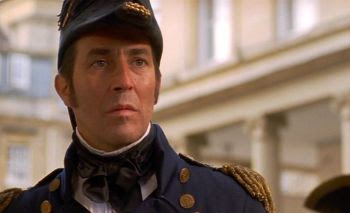
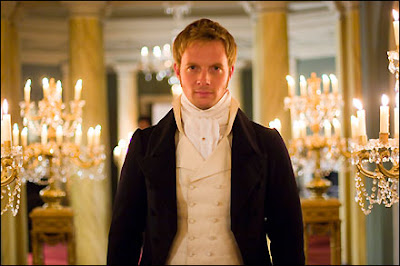
Now let's compare Anne Elliots...first the 1995 Persuasion, then the 2008 Persuasion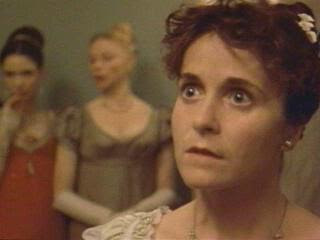
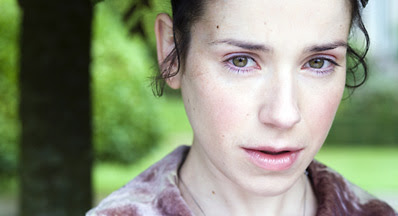
There is a cool character chart for the new movie.
As for the movies, I think I will *always* prefer the 1995 version. Even though none of the characters are glamorously beautiful, they're real and genuine. And that movie is *closer* to the book than this latest version. The real crime--in my opinion--is that they DID NOT HAVE the ultra-romantic scene with Captain Harville and Anne Elliot. They abbreviate that conversation down to a few lines, put it very nearly in the beginning, and have it taking place between Anne and a Captain Benwick. Therefore Wentworth can't overhear it, and doesn't have the *proper* motivation to write that beautiful, beautiful letter. Instead they invent a new excuse or else completely gloss over motivation entirely and have the letter showing up without provocation or reason. It's just suddenly there in the script. Silly, silly writers. Why mess with the majesty of the perfect scene???? If the new movie HAD bothered to get it right, perhaps there would be some competition between the two.

Okay, okay. I shouldn't really be thinking about hosting another challenge. But sometimes I just can't resist. This one will focus on--you guessed it--Women Writers who were writing in the nineteenth century. 1800-1899. (Or if you prefer 1801-1900). Any nationality. Any genre. British. American. Canadian. Etc. Poetry. Nonfiction. (Yes, essays count.) Fiction--whether short stories or novels. The author qualifies as long as they were female and writing at some time in those hundred years. (Note: If it was written during this time, but not published until after the author's death, it still counts for this challenge. If it was written before this time period (for example, 1700-1800) but first published within this time period (1800-1900), then I say it still counts. However, if the author was merely born in this time period but didn't write or publish anything until the next century, I say it doesn't count. And I'm willing to look the other way if you've got a book that you've been wanting to read that let's say was published in 1798 or 1902. But that's about as far as I'll go--two years in either direction.)
To sign up simply leave a comment.
You can find a long list of examples at A Celebration of Women Writers. There are also website specializing in particular periods (Victorian, for example) or specializing in nationality (British, for example). Or specializing in a particular author or family of authors (Bronte sisters, for example). I also know there is a great site that documents the American South. Fiction. Nonfiction. Both sides.
Other sites you might find helpful:
About site on Women Writers 1801-1900
African American Women Writers of the 19th Century
Domestic Goddesses: AKA Scribbling Women
A Celebration of Women Writers
The challenge will last all of 2008. But don't feel the need to stretch your reading out for all twelve months. Read what you want, when you want. How many books am I asking? I'd strongly suggest six books. But if you can only squeeze in four, I'll allow it. 6 Books, 12 Months. Overlaps with other challenges encouraged. (For example, 2 of your 6 can be titles you're reading for the Jane-Austen Mini-Challenge I'm hosting.)
Examples: Louisa May Alcott, Harriet Beecher Stowe, Charlotte Perkins Gilman, Mary Wollstonecraft Shelley, George Eliot, Emily Dickinson, Jane Austen, all of the Bronte sisters, Elizabeth Gaskell, Kate Chopin, Elizabeth Barrett Browning, etc. I'm sure I'm missing some biggies...but that's what I can think of off the top of my head.
What about poetry? What about short stories? If you choose a poet, then please review at least several poems or a whole collection of poems to review. If there is only one poem by that author that is available, then you may count it. (But try not to let this challenge just be reviewing six individual poems.) Short stories? Again, if there is a collection of short stories available by a particular author, review at least several of them and have them count as one.
What about biographies? If you want to read a biography of an author of this time period, then that works for me. Try to keep it balanced. If you go that route, maybe keep it three biographies and three actual works (novels, poetry collections, short story collections, autobiographies, essays, travel journals, letters, diaries etc.) by a qualifying author.
Becky's List (Of The Moment...You know how often I change my mind...)
At least 2 books by Jane Austen
At least 2 books by one or more Brontes
The Awakening and Other Stories by Kate Chopin
1 book by George Eliot (Middlemarch? Mill on the Floss? Something else...???)
or
Perhaps a poetry collection of Emily Dickinson???
Ooh, I like Narrow Stairs. What are your favorite tracks?
Rock band 2 is going to feature Lush’s “Deluxe”! Yay! Here’s a link to their complete song listing
http://mediation.tumblr.com/post/42237368/rock-band-2-track-list-by-decade
*sigh* I’m itching to play those songs, but I don’t own a playstation. Hey maybe we can convince our consortium to buy it and have a rock band librarian night! What do you think? Then if we get really good we could compete in the Dave and Busters rock band competition.
I like tracks 7-9: Grapvine Fires, Your New Twin Sized Bed, Long Division. All in all this album is cohesive and easy to listen to.